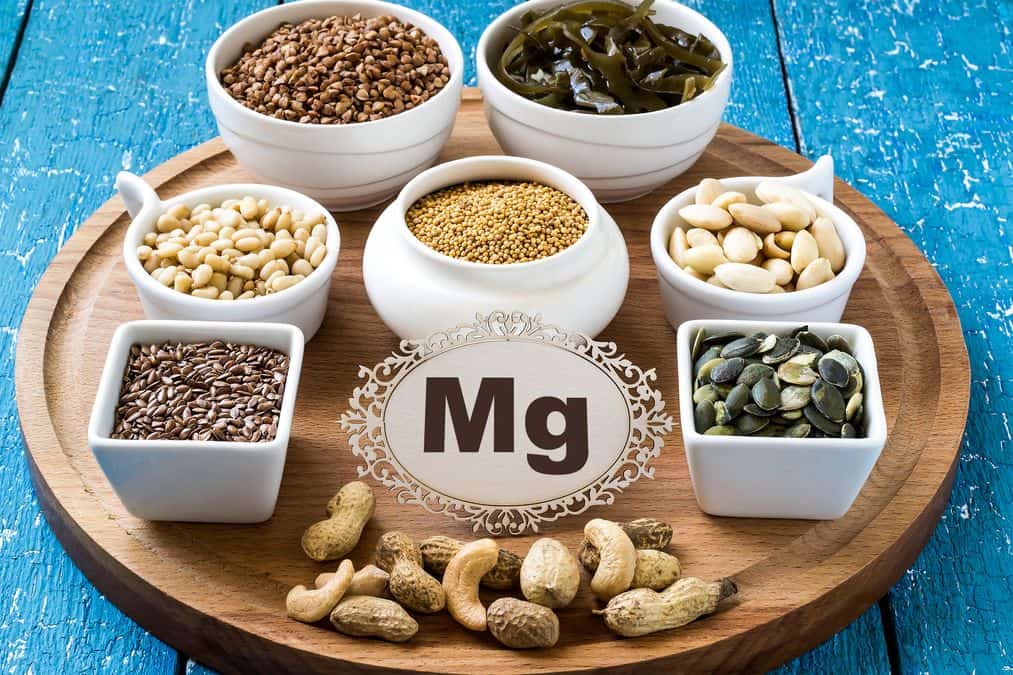
Magnesium – role and properties. Who should supplement it?
Magnesium is a very important nutrient, which should be supplied in appropriate amounts with food on a daily basis. In the body, it is found in the largest quantities in bones and teeth – in them there is about 55-60% of the total pool of this component. The remaining amounts are distributed mainly in muscles. Magnesium from food is absorbed mainly in small intestine, partly also in large intestine. Its deficiency is quite frequent, and at the same time dangerous to health – it activates more than 300 enzymes, so it takes part in most biochemical transformations occurring daily in our body.
Contents
Absorption of magnesium from food

It is worth knowing that magnesium taken with a diet can be utilized by the body in 30-60%. Its bioavailability depends on many factors. Protein and lactose, the so-called milk sugar, increase the absorption ofmagnesium. However, excessive amounts of fat, dietary fiber, tannins (present in teas), phytates (found in cereal products and pulses), and oxalates (their sources are sorrel, rhubarb, and cocoa) may reduce its absorption in the small intestine.
Of course you do not have to completely abandon products that are sources of substances limiting magnesium absorption, but it is worth remembering, for example, thorough soaking and sufficiently long cooking of leguminous vegetables, which cause reduction of the content of phytates present in them. It is also important to note that the absorption of magnesium may be decreased by another component, which is calcium. Therefore, if supplementation of both these components is necessary, care should be taken not to take them at the same time, but at intervals of several hours.
The best sources of magnesium
Products that stand out for their highest magnesium content are:
- cocoa, dark chocolate;
- buckwheat groats;
- brown rice;
- Whole-grain oatmeal;
- Whole-grain cereal products (bread, pasta);
- nuts, seeds and peanuts.
What role does magnesium play?
Magnesium has many very important functions in the body:
- it is an intracellular cation, activates more than 300 enzymes. It takes part in metabolism of carbohydrates, proteins, and fats;
- it takes part in the synthesis of ATP, i.e. energy production and metabolism. It is a very important component of the diet of all athletes;
- it regulates muscle function, ensuring their correct contractility. Magnesium deficiency is one of the most common causes of painful calf cramps;
- influences nerve and neuromuscular conduction;
- regulates brain and nervous system function, increases resistance to stress, may improve sleep rhythm and quality, and cognitive functions (memory, concentration, learning ability)
- is necessary for proper functioning of the heart, muscles, skeletal system;
- helps regulate blood pressure.
Magnesium deficiency

Studies show that magnesium deficiency is common, and many people do not consume magnesium in the amounts recommended. The most common cause of magnesium deficiency is an improper, monotonous diet based on highly processed foods. Magnesium deficiency can also be caused by:
- problems with the gastrointestinal tract, leading to impaired absorption; chronic diarrhea;
- excessive alcohol consumption;
- taking diuretics;
- chronic stress.
The most common symptoms indicative of a potential magnesium deficiency are eyelid twitching and painful calf cramps. You may also experience problems concentrating, falling asleep, fatigue, migraines, and nausea.
Magnesium excess
Excessive magnesium supply is relatively rare. It is very difficult to achieve too much with the usual diet. Inappropriate supplementation with too high doses and kidney disease most often lead to magnesium excess. This is mainly manifested by diarrhea and gastrointestinal problems. In extreme situations, even cardiac arrestcan occur.
How to increase the amount of magnesium in the diet?
The best sources of magnes ium are whole grain cereals, oatmeal and bran, pumpkin seeds, cocoa, nuts, almonds, buckwheat groats, and legumes. Make sure that they appear in your diet as often as possible. Avoid drinking strong coffee and tea with your meals, as they may reduce the assimilation of minerals, including magnesium. Limit highly processed food, sugar and sweets.
Who should supplement magnesium?
Magnesium supplementation is recommended for people with known deficiencies of this component, some athletes during periods of intensive training. Chronic stress, problems with falling asleep, concentration, and memory are also indications for supplementation. Pregnant womenshould alsoconsider supplementation, especially if they experience calf cramps – but this should always be preceded by consultation with a doctor.
The best magnesium supplements
There are many magnes ium supplements available on the market and sometimes it can be hard to choose the most suitable one for you. It is best to be guided by whether the preparation has the status of a drug or a supplement and the form of magnesium present in them. The general rule is that if you have to choose a preparation registered as an OTC drug (without prescription), it is best to choose this one, because of the many very detailed and restrictive requirements that it had to pass in order to be in circulation.
This gives a guarantee of its safety. Requirements concerning supplements are much weaker, however, it doesn’t mean that all of them are of bad quality – it’s worth to check carefully the producer and certificates, which it has, to be sure that what we buy will be really good for us .
Which magnesium to choose?
Magnesium in medicines and supplements in many preparations occurs in different forms. Here are the most common ones:
- magnesiumcitrate – it is well absorbed, but may cause gastrointestinal discomfort in people with sensitive digestive tracts;
- magnesiumlactate – well absorbed, should not cause stomach discomfort;
- magnesiummalate – well absorbed and tolerated by the digestive system, especially recommended for athletes;
- magnesiumcarbonate and magnesium oxide – poorly absorbed;
- magnesiumglycinate – well absorbed, especially useful for people with sleep problems and reduced resistance to stress;
- magnesiumtreonate – well absorbed, recommended especially in neurological disorders, depression, problems with concentration, memory;
As you can see, each form is slightly different and affects the body in a different way, so it is important not to choose the first better preparation, but think about what exactly we care about and what will be best for us in a given situation.
Sources:
- Gawęcki J.: Żywienie człowieka, podstawy nauki o żywieniu, PWN, 2012
- Włodarek D.: Dietotherapy, PZWL, 2014
- Ranade VV, Somberg JC. Bioavailability and pharmacokinetics of magnesium after administration of magnesium salts to humans. Am J Ther 2001;8:345-57
- Lindberg JS, Zobitz MM, Poindexter JR, Pak CY. Magnesium bioavailability from magnesium citrate and magnesium oxide. J Am Coll Nutr 1990;9:48-55.
- Walker AF, Marakis G, Christie S, Byng M. Mg citrate found more bioavailable than other Mg preparations in a randomized, double-blind study. Mag Res 2003;16:183-91
- Guerrera MP, Volpe SL, Mao JJ. Therapeutic uses of magnesium. Am Fam Physician 2009;80:157-62.



